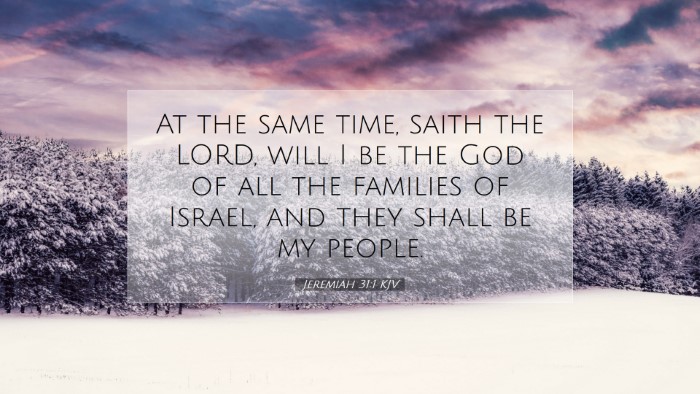Jeremiah 31:1 - Commentary and Insights
Jeremiah 31:1 states:
"At that time, declares the Lord, I will be the God of all the families of Israel, and they will be my people."
Introduction
This verse serves as a pivotal point in the Book of Jeremiah, encapsulating the hope of restoration for Israel after a protracted period of judgment and exile. It emphasizes God's unwavering commitment to His covenant people and the relational dynamic that He desires to maintain with them.
Contextual Analysis
This expression of divine promise occurs within a larger discourse about the restoration and future of Israel. The backdrop includes the Babylonian exile, a time marked by profound sorrow and loss for the people of God.
- Historical Context: The Babylonians had destroyed Jerusalem and the Temple, leading to a theological crisis among the Israelites. They struggled with questions of identity, covenant fidelity, and divine presence.
- Literary Context: Jeremiah 31 features a glorious shift from lamentation to hope, marking the transition from judgment to the promise of restoration.
Theological Insights
This verse is pivotal in understanding God’s nature and His relationship with humanity. It communicates foundational theological themes:
- Divine Faithfulness: Even in Israel’s disobedience, God’s commitment remains steadfast. Matthew Henry notes that “the Lord retains His affectionate relationship with His people, regardless of their waywardness.”
- Covenantal Relationship: The declaration of God being the God of “all the families of Israel” points to the inclusive nature of His covenant, suggesting that every individual and family is significant to Him.
- Redemptive Hope: Albert Barnes comments on the prophetic promise as a significant assurance. The phrase “they will be my people” indicates a reclamation and a renewed relationship, echoing the call to repentance and revival.
Exegesis of Key Terms
Understanding the key components of Jeremiah 31:1 requires careful examination of its language:
- “At that time”: This phrase suggests a future moment when God's plans will culminate in fulfillment. Adam Clarke interprets this as a reference to the messianic age, pointing to Christ as the ultimate fulfillment of these promises.
- “I will be the God of all the families”: Here, the use of “all” signifies an inclusive promise that transcends individual tribes, uniting them under one divine authority. The emphasis is on God’s omnipresence and accessibility.
- “they will be my people”: This highlights the reciprocity of the divine-human relationship. The people’s response, implied here, is both faith and obedience, thus establishing a two-way covenantal commitment.
Challenges of Application
While this verse brings hope, applying it in contemporary faith contexts can be challenging:
- Cultural Relevance: The challenge for modern believers is to understand this ancient text within our contemporary cultural milieu. Scholars may urge contemporary Israel and the Church to see how God’s promises intersect with their lives today.
- Faithfulness amidst Adversity: The historical backdrop of exile teaches perseverance in faith. Pastors and theologians should encourage congregants to remain faithful during trials, paralleling Israel’s journey with personal experiences of hardship.
Conclusion
Jeremiah 31:1 encapsulates God’s enduring love and faithfulness to His people amidst the darkness of history. For pastors, theologians, and scholars, this verse invites a robust discussion on God’s nature, the implications of covenant, and the hope for renewal. The promise that God will be their God underscores the relational aspect of faith, making it both a challenge and a comfort for believers today.
Further Reflection
As one meditates on Jeremiah 31:1, consider the profound implications of a God who desires to be in relationship with us. Reflecting on this passage through the lens of historical, literary, and theological contexts allows for a deeper appreciation of God’s intentions.


